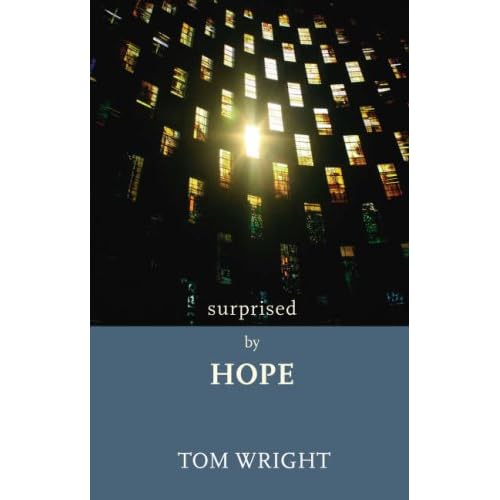Mumford and Sons – Roll Away Your Stone
I take it back. In my little blurb on this book a few posts back, I suggested that this wouldn’t be a very good introduction to N. T. Wright’s thinking. I was wrong. It may be the perfect book for that purpose. I read a bit and thought that it was going to be a toned down version of his exceptionally long treatment life after death and the Christian understanding of resurrection. It is that, but so much more.
 Who should read this book? Anyone who cares about understanding what the New Testament teaches about life after death. I think even the relatively informed Christian will have their thinking on this subject clarified. Anyone who wants to understand the gospel and salvation better. Anyone who wants to understand the mission of the church more fully in terms of the resurrection. Anyone who tires of simplistic reductions of the Christian faith that tend to rely more on categories of Greek philosophy than the story that emerges from the pages of Scripture.
Who should read this book? Anyone who cares about understanding what the New Testament teaches about life after death. I think even the relatively informed Christian will have their thinking on this subject clarified. Anyone who wants to understand the gospel and salvation better. Anyone who wants to understand the mission of the church more fully in terms of the resurrection. Anyone who tires of simplistic reductions of the Christian faith that tend to rely more on categories of Greek philosophy than the story that emerges from the pages of Scripture.
Here are a few gems…
[A] feature of many communities both in the postindustrial West and many of the poorer parts of the world is ugliness. True, some communities manage to sustain levels of art and music, often rooted in folk culture, which bring a richness even to the most poverty-stricken areas. But the shoulder-shrugging, functionalism of postwar architecture, coupled with the passivity born of decades of television, has meant that for many people the world appears to offer little but bleak urban landscapes, on the one hand, and tawdry entertainment, on the other. And when people cease to be surrounded by beauty, they cease to hope. They internalize the message of their eyes and ears, the message that whispers that they are not worth very much, that they are in effect less than fully human.
Ok, after you have wrapped your brain around that one, here’s another…
The power of the gospel lies not in the offer of a new spirituality or religious experience, not in the threat of hellfire (certainly not in the threat of being “left behind”), which can be removed if only the hearer checks this box, says this prayer, raises a hand, or whatever, but in the powerful announcement that God is God, that Jesus is Lord, that the powers of evil have been defeated, that God’s new world has begun.
Or…
As far as I can see, the major task that faces us in our generation, corresponding to the issue of slavery two centuries ago, is that of the massive economic imbalance of the world, whose major symptom is the ridiculous and unpayable Third World debt … I simply want to record my conviction that this is the number one moral issue of our day. Sex matters enormously, but global injustice matters far, far more.
But in order to understand the context of statements like these, one needs to wade through ones like this…
It is love that believes the resurrection. “Simon, son of John,” says Jesus, “do you love me?” There is a whole world in that question, a world of personal invitation and challenge, of the remaking of a human being after disloyalty and disaster, of the refashioning of epistemology itself, the question of how we know things, to correspond to the new ontology, the question of what reality consists of.
I think I’ve said this before, but there is no one writing today who more clearly expresses my own feelings, thoughts, misgivings, and hopes. While he begins with developing our understanding of the resurrection, he ends up leaving no stone unturned. Because he (and I) believe just that… the resurrection changes everything.

Great excerpts, great book. I haven’t had time to finish it, but I’d like to… in the meantime, I’m using Wright’s Simply Christian for an intro course, and my students are, unfortunately, puzzled (for now at least).
I can’t believe I’m saying this – but I might want to borrow that book.